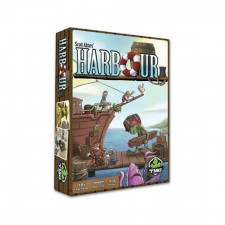Harbour Review
on Apr 13, 2015
If we’re being completely honest, there are probably few games that genuinely make you want to flip the table. Likewise, you can probably count on one hand those titles that make you want to punch an opponent in the teeth. Harbour just might be one game amongst that minority. Surprisingly, it has nothing to do with slipping that haughtily unnecessary British “u†in the title.
It all looks harmless on the surface and starts out innocently enough. Harbour is a pure resource management and conversion design with the goal of purchasing four buildings. You sell goods – wood, stone, livestock and fish – to earn cash. Each turn you do a little shopping, visiting one of the buildings along the strip. This ain't Rodeo Drive, though. More like layaway at the Farm & Home. Depending on the business, you’ll be gathering commodities and/or converting one or more of what you already own into something else. When you collect enough goods you ship them off, using the fat paycheck to snap up prime real estate.
Most available buildings, especially in the beginning, comprise a central pool. You can claim one with your little harbormaster meeple and resolve its action and ability – but only one player per spot. These buildings are also the same properties that are for sale. When you buy one, simply place it near you and draw a new one to fill its place along the boardwalk. If an opponent owns a building you may still use it, but must pay her a resource for the privilege – and vice versa.
That’s basically the game. Visit a building, collect or convert resources and sell them to purchase buildings. The first player to snatch up four shops triggers the end game. She with the most valuable properties wins. Sounds like a rather generic, non-thematic Euro about efficient cube-swapping, right? So then why in the world would I say that Harbour fosters a tendency to send players into violent rages? Because just like native advertising, there’s something more sinister lurking underneath. The game mockingly calls it a “Market.â€
This market would even drive Gordon Gekko into fits of muddled and seething fury. To spite the mundane resource management, this mechanic is what really drives the game. It stalks players like a cold-blooded predator, informing and looming over every decision you make. Goods along the market constantly increase and decrease based on a simplistic supply and demand model. The problem is that since there are only four commodities, it waffles more often than a politician in an election year.
The track consists of four spaces with values from two to five. At the beginning of the game, you randomly assign each resource a value which determines the amount you need of that type and its payout when you sell it. So if fish are currently worth four, then you must have four fish in order to sell. For that you earn $4. If you only have three fish then they aren't buying. If you have five or six, well that’s okay, but you must ship all excess and still only receive $4, thank you very much for the donation. The kick is that money must be spent on the same turn you ship goods. Since every building costs $6 or more, that means you’ll have to ship a combination of two or three goods at once, hopefully wasting as little as possible.
When you sell commodities you move their tokens down the track and push up the previous ones. Therefore, the market is continuously circling and values frequently fluctuate. Just as you’re ready to cash in some stone at $2 and wood at $4, someone sells some stuff screwing up your plans and you want to burn her wharf down. Plus some buildings let you manipulate parts of the market however you see fit. So a different player might rearrange the values just before you’re ready to hit pay dirt and then you just want to shove your fish in his face. Planning ahead in this vicious cycle can be a bear and a bunch of bull. It’s also funny, exciting, tense and rewarding when you pull it off. In fact, it elevates Harbour above its rather ordinary resource conversion core.
While you’re not crying or frothing at the mouth, Harbour moves along at a brisk pace. That’s another favorable aspect, as this style of game can easily turn monotonous. Thankfully though, actions are quick once you get the hang of the design’s buffet of symbols. A few cards use a string of icons that might remind you of calculus – although I wouldn't know, I didn't get that far.
The buildings are nice. The artwork is good and evokes a medieval/light fantasy theme with all of the tropes and proper homages, which doesn’t affect game play. However, there is a well-rounded mix and you won’t use every one in a game. That variety is enhanced by the design’s collection of starting buildings in which each player begins with a different property and its unique actions and abilities. Buildings also provide various benefits you may profit from through ownership. In short, the replay value is pleasantly higher than average for games of this nature.
Harbour is a workmanlike but solid medium-weight title with a surprisingly mischievous attitude. At first, it plays like any run-of-the-mill resource management game with a tacked-on faux fantasy theme. However, it soon spirals into a nasty, challenging and chaotic puzzle of market speculation and manipulation – with a tacked-on faux fantasy theme. If your shtick is careful planning, don’t weigh anchor here. If you like some chaos and interaction, this one offers plenty of choices, variety and chances to whack your neighbor. Just be prepared for revenge. And please don’t play it with sharp objects lying about…or even blunt ones. The temptation will be too great.

 Customer Support
Customer Support  Subscribe
Subscribe 




 Account
Account  Wishlist
Wishlist 

